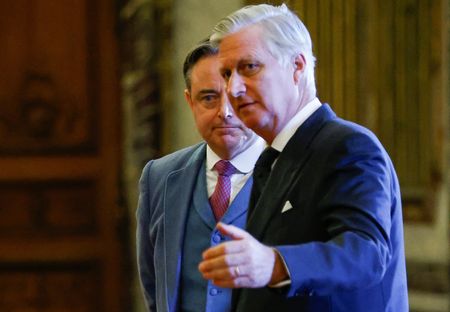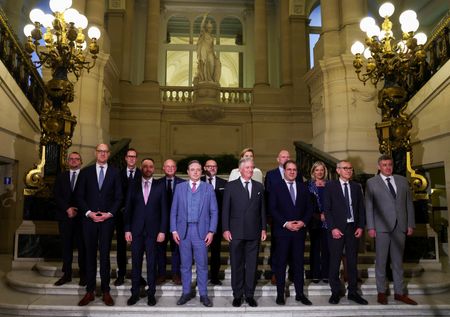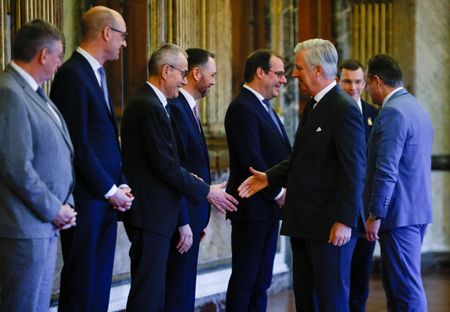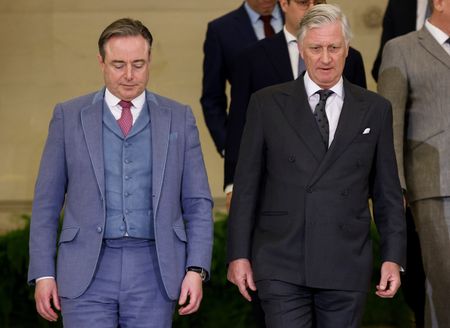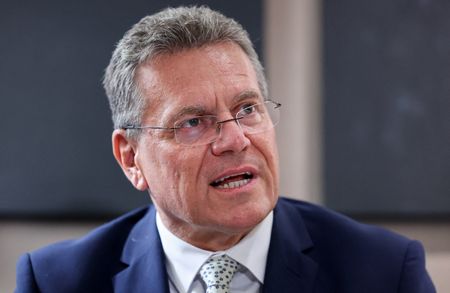By Bart H. Meijer and Geert De Clercq
BRUSSELS (Reuters) – New right-wing Belgian Prime Minister Bart De Wever said he wants to cool the European Union’s “regulatory fervour” to boost corporate competitiveness and that European Union defences should remain anchored within NATO.
De Wever, the first Flemish nationalist to lead Belgium and a sharp critic of its French-speaking region of Wallonia, presented his government at the Royal Palace on Monday, almost eight months after his N-VA party won an election.
In an interview with Wallonia broadcaster RTBF, De Wever said Belgium’s francophones “do not need to worry” as he expects to cooperate well with the liberal and centrist parties from the French-speaking south in his coalition government.
The new N-VA-led cabinet also includes Christian Democrats and socialists from Flanders, Belgium’s Dutch-speaking northern region, but not from the socialist PS, which has long been dominant in Wallonia but opted for the opposition after losing four seats.
After being sworn in, De Wever rushed to meet other EU leaders at a summit in Brussels called to discuss Europe’s defences against Russia and how to handle U.S. President Donald Trump after his decision to impose tariffs on goods from Canada, Mexico and China, and vow to do the same against the EU.
“It would be an error to think that Europe can defend itself alone, we need to continue the NATO alliance with the U.S.,” De Wever said.
French President Emmanuel Macron said on arrival at the EU summit that Russia’s invasion of Ukraine and Trump’s policies were pushing Europe to take more responsibility for its own physical and economic security.
Long a eurosceptic, De Wever said he wants the EU to focus more on its core functions. “The competitiveness of our economy is important, and with respect to that, we want to bring the EU’s regulatory fervour to more realistic proportions.”
At home, De Wever outlined plans to streamline state finances to save 23 billion euros, while increasing defence spending to 2% of GDP, in line with NATO commitments.
In December 2024, Belgium received an EU extension to present its budget in April 2025.
De Wever also plans to reduce immigration and ensure that regular employment is more rewarding than relying on benefit payments.
The coalition parties have agreed to limit unemployment benefits, currently not time-limited, to two years maximum. Another landmark reform is the implementation of a 10% capital gains tax on profits exceeding 10,000 euros.
De Wever further aims to reduce Belgian taxes on labour income, currently among the highest in Europe.
De Wever’s finance minister is Jan Jambon, from his N-VA party, and the new foreign minister is Maxime Prevot from centrist francophone party Les Engages.
At his first international appearance on Monday, De Wever – a witty Latinist in Belgium known for his Roman idioms and one-liners – said he was not immediately recognised by fellow EU leaders at the Brussels gathering.
“The first question I was asked upon arrival here was,‘Who are you?'” he said.
(Reporting by Bart Meijer and Geert De Clercq, writing by Geert De Clercq; editing by Barbara Lewis, Charlotte Van Campenhout and Mark Heinrich)

